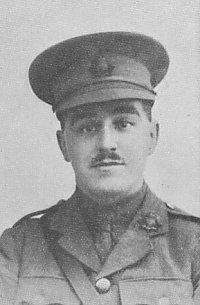
WALTER HENRY MORGAN
In common with so many people, Walter Henry owes his presence in Portsmouth to the Royal Navy, his father David (b. 1860) being a Ship's Carpenter in the Senior Service. David was probably already in the navy when he and his wife Mary (b. 1861) moved to Portsmouth from Pembroke Dock where both had been born and raised. They arrived in Portsmouth sometime in the mid 1880s and by 1891 had found a place to live at 76 Clive Road, Fratton.
Whilst in Portsmouth David and Mary had three children, Beatrice (b. 1886), Walter Henry (b. 1890) and Lilian (b. 1892). By 1901 they had all moved to 110 Chichester Road and in 1904 Walter Henry began a year's attendance at the Secondary School on Victoria Road North in Southsea.

At the end of that year Walter Henry became a Pupil Teacher under the Local Education Committee, and then proceeded to Bristol University College to prepare for the Teacher's Certificate. While at the Secondary School he gained a place in the Football Eleven by keen and skilful play, and later at Bristol acquitted himself so well as to be elected Captain of the Training Department Team.
At the time war was declared he held a post as Master at the Royal Hospital School, Greenwich. The duties of this office he at once set aside to enlist as a Private in the 6th Battalion Hampshire Regiment, and with his unit went to India in October, 1914. A year later he was given a commission and sent home for training. This being completed he went in May, 1916, as a 2nd Lieutenant of the 13th Hants, to France, and was there attached to the 15th Battalion.
On the l2th July, before he had been two months with the Expeditionary Force, his end came. The manner of it is best told in the words of his Colonel: "He died very gallantly attempting to save the lives of wounded men of another regiment in the Brigade, who were raiding the enemy's trenches. The wounded lay in 'no man's land,' and he went out to their relief. Personally, I feel the loss of an Officer the Regiment could ill spare and one who had he lived would undoubtedly have risen by his ability and courage far above his present rank."
From other accounts it is clear that Lieut. Morgan's act was quite voluntary and undertaken in the midst of heavy shell and machine-gun fire. He was killed instantaneously about 40 yards in front of the British trenches.
Further Information
The photograph above is taken from a memorial booklet published by Southern Grammar School from which extracts also appear above.
The Commonwealth War Graves Commission (CWGC) website lists Second Lieutenant Walter Henry Morgan, Hampshire Regiment, date of death, 12/07/1916, buried at the Berks Cemetery Extension (Grave Ref: I.E.2.).
Walter Morgan is remembered on the Southern Grammar School WW1 Memorial and on the Cenotaph. He is not listed in the 'National Roll of the Great War'.